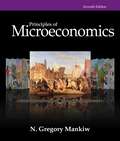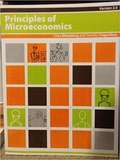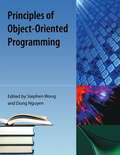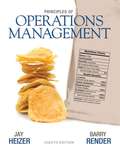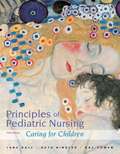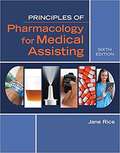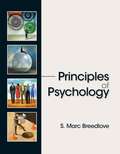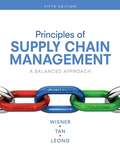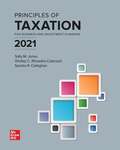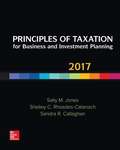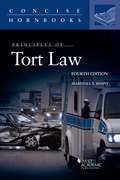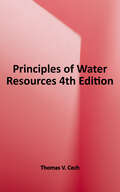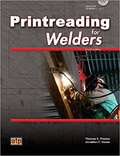- Table View
- List View
Principles of Microeconomics (2nd Edition)
by Timothy TaylorA textbook that is rooted to help students perform well in introductory economics and acquire the basic tools to deal with economics.
Principles of Microeconomics (4th edition)
by N. Gregory MankiwEconomics combines the virtues of politics and science. It is, truly, a social science. Its subject matter is society-- how people choose to lead their lives and how they interact with one another. But it approaches the subject with the dispassion of a science. By bringing the methods of science to the questions of politics, economics tries to make progress on the challenges that all societies face. This book is devoted more to applications-- and less to formal economic theory. Most chapters include case studies illustrating how the principles of economics are applied. Although the principles of economics are timeless, the application of those principles changes over time as events unfold and as policymakers consider new initiatives. To keep the study of economics fresh and relevant for each new cohort of students, teachers of economics must constantly update their courses. This new edition contributes to that effort by including dozens of new case studies and boxes.
Principles Of Microeconomics (Seventh Edition)
by N. Gregory MankiwWith its clear and engaging writing style, PRINCIPLES OF MICROECONOMICS, Seventh Edition, continues to be one of the most popular books on economics available today. Mankiw emphasizes material that you are likely to find interesting about the economy (particularly if you are studying economics for the first time), including real-life scenarios, useful facts, and the many ways economic concepts play a role in the decisions you make every day.
Principles of Microeconomics Version 2.0
by Libby Rittenberg Timothy TregarthenFlat World Knowledge is honored to publish Version 2.0 (an orginal re-launch) of Tim Tregarthen's wonderful principles of microeconomics book, and proud to bring Tim's incredible talents as a teacher back to life so future generations of students can continue to learn from him.
Principles of Modern Chemistry
by David Oxtoby H. Gillis Laurie ButlerLong considered the standard for covering chemistry at a high level, PRINCIPLES OF MODERN CHEMISTRY continues to set the standard as the most modern, rigorous, and chemically and mathematically accurate book on the market. This authoritative text features an "atoms first" approach and thoroughly revised chapters on Quantum Mechanics and Molecular Structure (Chapter 6), Electrochemistry (Chapter 17), and Molecular Spectroscopy and Photochemistry (Chapter 20). In addition, the text utilizes mathematically accurate and artistic atomic and molecular orbital art, and is student friendly without compromising its rigor. End-of-chapter learning aids now focus on only the most important key objectives, equations and concepts, making it easier for readers to locate chapter content, while new applications to a wide range of disciplines, such as biology, chemical engineering, biochemistry, and medicine deepen readers' understanding of the relevance of chemistry in today's world.
Principles of Neural Science, Fifth Edition
by Eric R. Kandel James H. Schwartz Thomas M. Jessell Steven A. Siegelbaum A. J. HudspethUltimately, Principles of Neural Science affirms that all behavior is an expression of neural activity, and that the future of clinical neurology and psychiatry hinges on the progress of neural science. Far exceeding the scope and scholarship of similar texts, this unmatched guide offers a commanding, scientifically rigorous perspective on the molecular mechanisms of neural function and disease―one that you’ll continually rely on to advance your comprehension of brain, mind, and behavior.
Principles of Object-Oriented Programming
by Alex Tribble Connexions Mark HusbandAn objects-first with design patterns introductory course
Principles of Operations Management (Eighth Edition)
by Jay Heizer Barry RenderThis book presents a state-of-the- art view of the activities of the operations function. This book will also help you understand how OM affects society and your life.
Principles of Pediatric Nursing: Caring for Children (Fifth Edition)
by Jane W. Ball Ruth C. Bindler Kay J. CowenThe goal of the fifth edition of this textbook is to provide core pediatric nursing knowledge that prepares students for excellence in nursing, and to offer the tools of scholarship and critical thinking required during practice.
Principles Of Pharmacology For Medical Assisting (Mindtap Course List)
by Jane RiceBecome a medical assistant with PRINCIPLES OF PHARMACOLOGY FOR MEDICAL ASSISTING, 6E! Written by a seasoned instructor to meet the specific needs of medical assisting students, this book leverages current health care standards to explore common practices, procedures, medications, and drug preparations, explaining concepts in clear and easy-to-understand language. For deeper focus, graphic icons throughout the readings point out important issues such as legal implications, safety in administering medications, warnings and cautions, medical documentation, ethical considerations, and patient teaching. Designed to help you succeed in your course and beyond, PRINCIPLES OF PHARMACOLOGY FOR MEDICAL ASSISTING, 6E also includes special learning features such as spotlights on key topics, discussions about special considerations for older adults and children, critical thinking questions and activities, spot checks for self-testing, and much more!
Principles Of Psychology
by S. Marc BreedloveOrganized around four well-established core principles, Principles of Psychology provides students with a framework to understand the science of behavior. Written in a conversational style, the text is organized around the following four well-established principles that serve as touchstones for the field of psychology: --The mind is a process at work in a physical machine, the brain. --We are consciously aware of only a fraction of our mental activity. --We constantly modify our behavior, beliefs, and attitudes according to what we perceive about the people around us. --Experience physically alters the structure and function of the brain. With these four principles as a framework for the text, Principles of Psychology emphasizes that psychology is a science through discussion of relevant big-picture and proven concepts and cutting-edge research-based investigations that examine behavioral, psychological, and neuroscience experiments. By presenting data and facts from other scientific disciplines, as well as real-world vignettes and stories, Marc Breedlove teaches the reader how to think critically and scientifically about the underlying mechanisms of behavior. In-Text Features --Vignette: Each chapter begins with a story, an instance when behavior has a big impact on someone's life. The chapter returns to the vignette several times as we cover findings that relate to that particular case. --Researchers at Work: In every chapter, important discoveries are explained and illustrated to highlight the process of experimentation and hypothesis testing. Over the course of the book, the progression of experiments provides an increasingly sharper picture of the factors shaping behavior. --Skeptic at Large: Intended to sharpen the student's critical thinking skills, these boxes explore a widespread misconception and demonstrate how scientific research disproves it. The exploration of scientific experimentation also reinforces the Researchers at Work feature. --Psychology in Everyday Life: These are topics where knowledge of psychology might be applicable to everyday life, such as whether people with schizophrenia are violent, the importance of "blind" auditions for musicians, how to stop smoking, or how conditioned taste aversion might cause you to stop eating sushi when you used to love it. --The Cutting Edge: Just prior to the end of every chapter, this feature explores an exciting report of current research. Showing students these vibrant and bold experiments will emphasize that psychology research remains alive and well. --Think Like a Psychologist: Principles in Action: To close each chapter, each principle is related back to the vignette to show the student that when they observe an interesting behavior they can recall and apply the four principles. If they can do this, they will indeed be thinking like a psychologist.
The Principles of Psychology (Volume #2)
by William JamesAnyone wanting a thorough introduction to psychology will find this work useful and engaging. This second volume covers sensation, imagination, reasoning, instinct, emotions, will, Hypnotism, movement, and the perception of objects and space.
The Principles of Psychology (Volume #1)
by William JamesAnyone wanting a thorough introduction to psychology will find this work useful and engaging. This first volume contains The Scope of Psychology, The Functions of the Brain, On Some General Conditions of Brain Activity, Habit, The Automaton Theory, The Mind-Stuff Theory, The Methods and Snares of Psychology, The Relations of Minds to Other Things, The Stream of Thought, The Consciousness of Self, Attention, Conception, Discrimination and Comparison, Association, The Perception of Time and Memory.
Principles of Sedimentology and Stratigraphy (Fifth Edition)
by Sam BoggsThis concise treatment of the fundamental principles of sedimentology and stratigraphy highlights the important physical, chemical, biological, and stratigraphic characteristics of sedimentary rocks. It emphasizes the ways in which the study of sedimentary rocks is used to interpret depositional environments, changes in ancient sea level, and other intriguing aspects of Earth's history.
Principles of Social Psychology
by Charles StangorHave you ever had trouble teaching the various topics of social psychology and fitting them together to form a coherent field? Dr. Stangor said he felt like he was presenting a laundry list of ideas, research studies, and phenomena, rather than an integrated set of principles and knowledge. He felt like this was not only hard for him, but even more challenging for his students. He wondered how they could be expected to remember and understand all of the many phenomena that we social psychologists study? And how could they tell what was most important? It was then that he realized a fresh approach to a Social Psychology textbook was was needed to structure and integrate their learning; thus, Principles of Social Psychology was born.
Principles of Social Psychology
by Charles StangorHave you ever had trouble teaching the various topics of social psychology and fitting them together to form a coherent field? Dr. Stangor said he felt like he was presenting a laundry list of ideas, research studies, and phenomena, rather than an integrated set of principles and knowledge. He felt like this was not only hard for him, but even more challenging for his students. He wondered how they could be expected to remember and understand all of the many phenomena that we social psychologists study? And how could they tell what was most important? It was then that he realized a fresh approach to a Social Psychology textbook was was needed to structure and integrate their learning; thus, Principles of Social Psychology was born.
Principles of Sociological Inquiry
by Amy BlackstoneThe author of Principles of Sociological Inquiry: Qualitative and Quantitative Methods, Amy Blackstone, started envisioning this textbook while sitting in her own undergraduate sociology research methods class. She enjoyed the material but wondered about its relevance to her everyday life and future plans (the idea that one day she would be teaching such a class hadn't yet occurred to her).
Principles of Supply Chain Management: A Balanced Approach
by Joel Wisner Keah-Choon Tan G. Keong LeongThis book helps you examine the latest practices, trends, and emerging developments and guides you step-by-step through the management of all supply chain activity. You review issues related to both domestic and global supply chains as comprehensive, one-of-a-kind coverage encompasses important processes in operations, purchasing, logistics, as well as process integration. A balanced approach follows the natural flow through the supply chain. Well-organized chapters demonstrate the practical applications of supply chain management in today's workplace with the help of intriguing SCM Profiles and interesting real business examples. Relevant end-of-chapter questions, problems, and new cases help you put what you learn into practice as you sharpen your management skills.
Principles Of Taxation For Business And Investment Planning
by Sandra R. Callaghan Shelley C. Rhoades-Catanach Sally JonesPrinciples of Taxation for Business and Investment Planning focuses on the role taxes play in business and investment decision, presenting the general roles of taxation and discussing its implications for all tax-paying entities before delving into a specific exception. The benefit of this approach is a strong grasp of the fundamental principles informing taxation rules: students comprehend the framework of the tax system, making future changes to the tax code easier to understand-no matter how many there are. <p><p> Unlike traditional introductory titles, Principles of Taxation for Business and Investment Planning downplays the technical detail that makes the study of Taxation convoluted and off-putting for business students. This title shows students that an understanding of Taxation is not only relevant, but critical to their success in the business world. Don't just teach your students the tax code; teach them how the tax code affects business decision making with the current edition!
Principles of Taxation for Business and Investment Planning (2017 Edition)
by Shelley Rhoades-Catanach Sally M. JonesPrinciples of Taxation for Business and Investment Planning focuses on the role taxes play in business and investment decision, presenting the general roles of taxation and discussing its implications for all tax-paying entities before delving into a specific exception. The benefit of this approach is a strong grasp of the fundamental principles informing taxation rules. This helps students comprehend the framework of the tax system, making future changes to the tax code easier to understand-no matter how many there are. Unlike traditional introductory texts, Principles of Taxation for Business and Investment Planning downplays the technical detail that makes the study of taxation such a nightmare for business students. This text attempts to convince students that an understanding of taxation is not only relevant but critical to their success in the business world. Don't just teach your students the tax code; teach them how the tax code affects business decision making with the 2017 edition!
Principles Of Tort Law
by Marshall ShapoPresenting the law of tort as a body of principles, this authoritative textbook leads students to an incisive and clear understanding of the subject. Each tort is carefully structured and examined within a consistent analytical framework that guides students through its preconditions, elements, defences and remedies. Clear summaries and comparisons accompany the detailed exposition, and further support is provided by numerous diagrams and tables, which clarify complex aspects of the law. Critical discussion of legal judgments encourages students to develop strong analytical and case-reading skills, whilst key reform proposals and leading cases from other jurisdictions illustrate different potential solutions to conundrums in tort law. A rich companion website, featuring ten additional chapters and sections on more advanced areas of tort law, completes the learning package. Written specifically for students, the text is also ideal for practitioners, litigants, policymakers and law reformers seeking a comprehensive and accurate understanding of the law.
Principles of Water Resources: History, Development, Management, and Policy
by Thomas V. CechProper management of water resources can take many forms, and requires the knowledge and expertise to work at the intersection of mathematics, geology, biology, geography, meteorology, political science, and even psychology. <p><p>This book provides an essential foundation in water management and development concepts and practices, dissecting complex topics into short, understandable explanations that spark true interest in the field. Approaching the study of water resources systematically, the discussion begins with historical perspective before moving on to physical processes, engineering, water chemistry, government regulation, environmental issues, global conflict, and more. <p><p>Now in its fourth edition, this text provides the most current introduction to a field that is becoming ever more critical as climate change begins to threaten water supplies around the world. As geography, climate, population growth, and technology collide, effective resource management must include a comprehensive understanding of how these forces intermingle and come to life in the water so critical to us all.
Principles & Practices of New Jersey Real Estate (19th Edition)
by Frank W. Frank W. KovatsThe economic importance of real estate today demands a higher professional level for all persons dealing in real estate, with an increased emphasis on educational requirements. Also, every state requires that a person engaging professionally in the real estate business, either as a broker or as a salesperson, must be licensed, and in each case, a state examination is a prerequisite for a license. Principles and Practices of New Jersey Real Estate has been written to serve as an educational guide for students and for persons desiring to take New Jersey's real estate licensing examination, as a quick reference for those already in the profession, and for use by the many other professionals dealing with various aspects of real estate.
Principles, Programs & Assessments for Training and Exercise 2nd Edition
by Tony D. AirhartThe contents of the book are: The Importance of Increasing Physical Activity and Exercise, Assessing Physical Fitness, Essential Knowledge for Developing a Fitness Program, Principles for Developing Muscular Strength and Endurance, Principles for Developing Cardiorespiratory Fitness, Principles for Developing Flexibility, and Basics of Nutrition.
Printreading For Welders
by Thomas E. Proctor Jonathan F. GossePrintreading for Welders is an established text/workbook that presents an introduction to printreading fundamentals, American Welding Society (AWS) welding symbols, and related printreading applications found in the welding and fabrication industry. This edition includes the latest AWS standards and welding symbol specifications with color-enhanced illustrations, detailed prints, and descriptive photos. This industry-leading text/workbook has an open, contemporary design with helpful factoids incorporated throughout. Interactive printreading tests, Quick Quizzes®, and flash cards on the CD-ROM offer challenging activities for testing print interpretation skills and knowledge. The Printreading for Welders text/workbook and CD-ROM package is the industry leader in providing numerous industry prints and skill-building activities. An essential companion text/workbook to Welding Skills, Printreading for Welders includes all the printreading and related math content necessary to implement an AWS SENSE-based curriculum.

